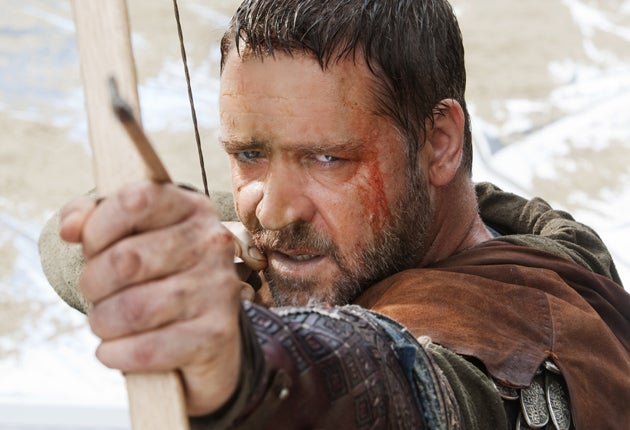Cannes Film Festival
Ridley Scott's new version of 'Robin Hood' is a heavy-handed way to open the most important festival in cinema's year

Last week, the outlook seemed grim for Cannes, as freak tidal phenomena battered the Côte d'Azur and wrecked beachside restaurants. Despite that, the festival got going as planned on Wednesday night, but festival-goers are beginning to think that a little more waterfront drama could only liven things up. We'd do anything for a headline that read "New wave shakes up Cannes".
So far, this is shaping up to be the quietest Cannes in some time, after a vintage programme last year. This year's opener was a dour romp through the greenwood as Ridley Scott and Russell Crowe took on Robin Hood. The best that can be said about their effort is that it is nowhere near as silly as the Kevin Costner version, but neither is it, as you might have hoped, Gladiator with crossbows. Allegedly big on historical accuracy – though I've never heard of the Merry Men thwarting a French invasion – the film is essentially a pumped-up superhero-origin story that starts with sullen archer Robin Longstride (Crowe, with grizzled chops and an accent somewhere between Nottingham and Dublin) making his way home from the Crusades, and ends with him taking up residence in Sherwood Forest.
The film has a few things to commend it. There are lively battle scenes shot in the jerky, gritty, post-Private Ryan manner, all boiling oil, flying rocks and squalor. And there are lively turns by the likes of Mark Strong (the current go-to man for shiny-pated malevolence) and Mark Addy as a mead-quaffing, bee-keeping Friar Tuck (tossing a hive at his enemies: "Gentlemen! Enjoy!"). Cate Blanchett, as Marian, is still using her crisp Katharine Hepburn delivery from The Aviator – and going into battle in chainmail and helmet. Crowe, though, is woefully sullen. And it's bizarre to see Cannes kicking off with a film in which the French are depicted as utterly evil – treacherous, untrustworthy, and they speak in yellow subtitles. I suppose it just proves that festival director Thierry Frémaux has a sense of humour – which is more than you can say of Messrs Scott and Crowe.
Meanwhile, there's little to warm the critical cockles. It was heartening, as ever, to see the veteran Portuguese director Manoel de Oliveira show up with a new film (and I do mean veteran: he recently turned 101, and apparently his secret is sardines). But his metaphysical romance The Strange Case of Angelica, about a photographer and an amorous ghost, was one of his more rarefied efforts. Nor did Chongqing Blues, by China's Wang Xiaoshuai, live up to its promise. It's the story of a man returning after years away to find out why his son was killed in a supermarket siege. The first hour is terrific – a fabulously shot inquiry into the new China's generational divide. Then in the second it becomes a standard redemption story.
It wouldn't be Cannes without Mathieu Amalric, the hardest-working actor in French art cinema, and recent Bond villain. He has a directing career too, but his competition entry On Tour is unlikely to boost that enormously. Amalric plays a down-at-heel producer acting as Svengali to a group of American burlesque queens touring coastal France. Brassy opening titles and the names of the performers playing themselves – Kitten on the Keys, Dirty Martini, Roky Roulette – promise jollity and raunch, and the occasional number with balloons or Louis Quatorze outfits is certainly eye-opening. But Amalric is less interested in the Felliniesque divas than in his own hapless character, who can barely go to the supermarket without being smacked round the chops. And the seedy moustache he sports is decidedly distracting. No wonder a passing punter was heard to dismiss the film as "all tits and whiskers".
Better value by far was South Korean comp entry The Housemaid, by Im Sang-Soo, a remake of a 1960 cult classic. It's the story of a naive young woman who goes to work in the sumptuous house of a super-rich family, and has an affair with the alpha male of the house, then sees her position become very uncomfortable. Sleekly controlled and very black, it fizzles out in the last stretch, but for sheer entertainment – and for putting the satirical knife into the super-wealthy – it's very good value.
But the competition film that has really made a big impression is Mike Leigh's Cannes comeback Another Year, which features a hard core of long-time Leigh regulars, including Jim Broadbent and Ruth Sheen. They play happily married London couple Gerri and Tom (get it?) who spend a year coping with the traumas of their friends and family.
Vera Drake lead, Imelda Staunton, returns for a terse cameo, and the film turns out to be one of Leigh's most ambitious – a narratively loose but very cogent ensemble piece about family, ageing, self-deception and the effects of time.
The only legitimate piece of Hollywood glitz on show was Wall Street: Money Never Sleeps, in which Oliver Stone revives his 1980s demon banker Gordon Gekko for the age of Lehman Brothers.
All the flashy computer graphics in the world can't make the financial meltdown as visually interesting as Stone would like, and he's not getting any subtler with his visual metaphors (bubbles! dominoes!). The film is outrageously knowing (Michael Douglas smirks, "What – nobody here believes in comebacks?") but makes up in glossy brashness what it lacks in narrative interest. Josh Brolin is formidably nasty as the banker who out-Gekkos Gekko, Douglas is more sleekly lizardy than ever, and ever-gaminish Carey Mulligan contributes a human touch and a more than passable US accent.
Next Week:
Jonathan Romney sees what happens when Werner Herzog and Nicolas Cage make a cop movie – Bad Lieutenant
Join our commenting forum
Join thought-provoking conversations, follow other Independent readers and see their replies
Comments
Bookmark popover
Removed from bookmarks